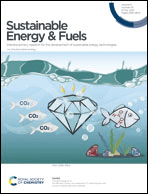
Sustainable Energy & Fuels
Scope & Guideline
Advancing the Future of Energy Solutions
Introduction
Aims and Scopes
- Energy Conversion Technologies:
Research on various technologies for converting renewable energy sources into usable forms, including solar, wind, and hydroelectric power. - Electrocatalysis and Electrode Materials:
Development and optimization of catalysts and electrode materials for efficient electrochemical processes, such as hydrogen evolution and CO2 reduction. - Photocatalysis and Solar Fuels:
Exploration of photocatalytic processes for solar energy utilization, including the production of hydrogen and other fuels from solar-driven reactions. - Biomass and Waste Valorization:
Research focused on the conversion of biomass and waste materials into energy, fuels, and chemicals, contributing to circular economy concepts. - Advanced Materials for Energy Storage:
Investigation of innovative materials for energy storage systems, including batteries and supercapacitors, aimed at improving efficiency and sustainability. - Life Cycle and Techno-economic Assessments:
Comprehensive evaluations of the environmental and economic impacts of energy technologies, promoting sustainable practices in energy production and consumption.
Trending and Emerging
- Green Hydrogen Production:
There is a significant increase in research focused on green hydrogen generation, utilizing renewable energy sources and innovative electrolysis techniques. - Carbon Capture and Utilization (CCU):
The integration of carbon capture technologies with energy systems is becoming a prominent theme, emphasizing the need to reduce carbon emissions and recycle CO2. - Advanced Energy Storage Solutions:
Emerging interest in next-generation energy storage technologies, including sodium-ion batteries and supercapacitors, is notable as researchers seek alternatives to lithium-ion systems. - Sustainable Chemical Processes:
Research on sustainable chemical production methods from biomass and waste materials is gaining momentum, highlighting the importance of circular economy practices. - Nanomaterials for Energy Applications:
The use of nanotechnology in developing advanced materials for energy conversion and storage is trending, with a focus on enhancing efficiency and performance.
Declining or Waning
- Traditional Fossil Fuel Technologies:
Research related to conventional fossil fuel extraction and utilization has diminished, reflecting a broader shift towards renewable energy sources. - Non-renewable Material Applications:
The focus on non-renewable materials for energy systems is decreasing as more emphasis is placed on sustainable and biodegradable alternatives. - Basic Research in Energy Physics:
Fundamental physics studies in energy conversion have seen less prominence, with a shift towards applied research and technology development. - Conventional Battery Technologies:
Research on traditional lithium-ion battery technologies is waning in favor of investigations into more sustainable and innovative energy storage solutions. - Single-use Energy Products:
There is a declining interest in single-use energy products, as the field moves towards sustainable, reusable, and recyclable energy solutions.
Similar Journals
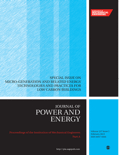
PROCEEDINGS OF THE INSTITUTION OF MECHANICAL ENGINEERS PART A-JOURNAL OF POWER AND ENERGY
Advancing Innovation in Power and Energy EngineeringPROCEEDINGS OF THE INSTITUTION OF MECHANICAL ENGINEERS PART A-JOURNAL OF POWER AND ENERGY, published by SAGE PUBLICATIONS LTD, is a pivotal journal dedicated to advancing the fields of mechanical engineering and energy technology. With a history spanning from 1983 to 2024, this journal provides a respected platform for researchers and practitioners to disseminate findings that address contemporary challenges in power generation, energy efficiency, and sustainable engineering practices. As evidenced by its quarter ranking in Q3 within the categories of Energy Engineering and Power Technology, and Mechanical Engineering, it serves as a significant resource for academics aiming to enhance their understanding and explore innovation in these critical areas. While currently not an open-access journal, the research published here is invaluable for both ongoing education and professional practice, making it an essential read for anyone engaged in the engineering disciplines.
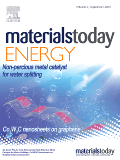
Materials Today Energy
Empowering Research for a Greener Energy FutureMaterials Today Energy is a premier journal published by Elsevier, focusing on the interdisciplinary field of energy materials. With an ISSN of 2468-6069, the journal is renowned for its impactful research as evidenced by its impressive Q1 quartile rankings in multiple categories including Energy Engineering and Power Technology, Fuel Technology, and Renewable Energy. It stands out with strong Scopus rankings, highlighting its significance in the respective research communities, such as being ranked 3rd in Nuclear Energy and Engineering. Established from 2016 to 2024, the journal aims to provide a platform for innovative research that addresses the global demands for sustainable energy solutions. Although it is not open access, Materials Today Energy is accessible to a broad audience, encouraging collaborations among researchers, professionals, and students in the pursuit of advancing materials science and energy technologies. This makes it an essential resource for those looking to remain at the forefront of discoveries that shape the future of energy.
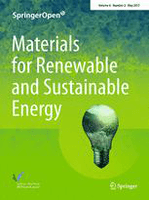
Materials for Renewable and Sustainable Energy
Transforming energy challenges into sustainable solutions.Materials for Renewable and Sustainable Energy, published by SPRINGER HEIDELBERG, stands at the forefront of research dedicated to advancing the fields of materials science and sustainable energy solutions. With an ISSN of 2194-1459 and an E-ISSN of 2194-1467, this prestigious journal has gained recognition as an Open Access platform since 2012, allowing broader access to innovative research. Situated in Switzerland, it boasts a distinguished reputation, reflected in its impressive H-index and classification within the Q1 and Q2 categories across multiple relevant fields, including Electronic, Optical and Magnetic Materials, Fuel Technology, Materials Chemistry, and Renewable Energy. Its Scopus rankings affirm its significance, particularly notable with a 29th place in Fuel Technology, placing it in the 77th percentile among peers. Covering a comprehensive array of topics from sustainable materials to cutting-edge energy technologies, Materials for Renewable and Sustainable Energy aims to disseminate pivotal knowledge that addresses the global challenges of sustainability and environmental preservation, making it an invaluable resource for researchers, professionals, and students alike.

Materials Today Sustainability
Advancing sustainable solutions for a brighter tomorrow.Materials Today Sustainability is a leading journal in the interdisciplinary field of sustainable materials, published by ELSEVIER. With a strong commitment to advancing knowledge in sustainability and materials science, this journal encompasses a broad range of topics, including renewable energy innovations, sustainable engineering, and eco-friendly materials development. Achieving a prestigious Q1 ranking in 2023 across Chemistry (Miscellaneous), Materials Science (Miscellaneous), and Renewable Energy, this journal plays a crucial role in disseminating high-impact research that addresses global sustainability challenges. With an impressive Scopus ranking that positions it among the top journals in Chemistry, Materials Science, and Renewable Energy, Materials Today Sustainability is an invaluable resource for researchers, professionals, and students dedicated to driving forward the agenda of sustainability and material innovation. The journal is accessible through a robust open access model, ensuring the research reaches a global audience, facilitating collaboration and innovation in this critical field.

SusMat
Transforming Ideas into Sustainable PracticesSusMat is a pioneering open access journal published by WILEY, with an ISSN of 2766-8479 and E-ISSN of 2692-4552, dedicated to advancing knowledge in the field of sustainable materials and technologies. Launched in 2021, SusMat aims to provide a vibrant platform for researchers, professionals, and students from interdisciplinary backgrounds to explore and disseminate innovative materials and strategies that promote sustainability. With an emphasis on high-quality, peer-reviewed research, this journal contributes to the growing body of literature essential for addressing contemporary environmental challenges. Furthermore, the open access format enhances accessibility and dissemination of knowledge, encouraging broader engagement and collaboration within the scientific community. Discover the future of sustainable materials at SusMat, where impactful research meets global sustainability goals.

Energy Materials
Innovating Materials for a Greener Tomorrow.Energy Materials is a pioneering journal published by OAE PUBLISHING INC, dedicated to the dynamic field of energy materials science and engineering. With a focus on advancing knowledge related to materials used in various energy applications such as batteries, fuel cells, and solar cells, this open-access journal aims to disseminate cutting-edge research and innovative methodologies to a global audience. By offering a platform for original research, reviews, and case studies, Energy Materials plays a crucial role in bridging the gap between materials science and energy technology, facilitating the development of sustainable energy solutions. Researchers, professionals, and students alike will find invaluable insights in its pages, fostering advancements in this essential sector. To explore the latest developments in energy materials, visit Energy Materials at OAE PUBLISHING INC.
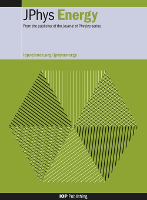
Journal of Physics-Energy
Exploring the Frontiers of Energy and Materials ChemistryJournal of Physics-Energy, published by IOP Publishing Ltd, is a leading Open Access journal that serves as a dynamic platform for the dissemination of high-quality research within the interdisciplinary realms of energy, materials science, and materials chemistry. Since its inception in 2019, the journal has gained remarkable recognition, achieving a prestigious Q1 ranking in multiple categories in 2023, highlighting its impact within these rapidly evolving fields. With its Scopus Ranks, placing it in the top 10% of journals for General Energy and within the top 20% for Materials Science disciplines, it reflects the commitment to excellence in research and innovation. Conveniently based in the United Kingdom, the journal is designed to facilitate collaboration and knowledge exchange among researchers, professionals, and students dedicated to advancing the understanding of energy technologies and materials science. The open access model ensures that cutting-edge research is freely available, promoting global accessibility and engagement with the latest scientific advancements.
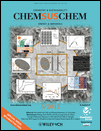
ChemSusChem
Innovating Tomorrow's Sustainable Chemical ProcessesChemSusChem is a premier interdisciplinary journal, published by WILEY-V C H VERLAG GMBH, that focuses on the critical fields of Chemical Engineering, Energy, Environmental Chemistry, and Materials Science. Since its inception in 2008, the journal has consistently maintained a Q1 ranking across multiple categories, highlighting its role as a vital resource for researchers and professionals dedicated to advancing sustainable chemical processes and technologies. With an impressive impact factor, it ranks 12th in General Chemical Engineering and is highly regarded within its scopes, indicating the journal's commitment to publishing high-quality, innovative research that addresses global challenges in energy and environmental sustainability. Though it operates on a subscription model, its contributions are essential for those in academia and industry seeking cutting-edge developments in sustainable chemistry. As it approaches its convergence span through 2024, ChemSusChem continues to shape the future of sustainable chemistry, making it a must-read for students, researchers, and practitioners alike.

MRS Energy & Sustainability
Advancing Energy Solutions for a Sustainable FutureMRS Energy & Sustainability is a premier interdisciplinary journal published by SpringerNature, focusing on advancing the understanding of energy systems and sustainability within the context of materials science and engineering. Since its inception in 2014, this journal has rapidly gained recognition in the academic landscape, achieving impressive rankings including Q1 in Electronic, Optical and Magnetic Materials and Mechanics of Materials, and Q2 in Energy Engineering and Power Technology as well as Renewable Energy, Sustainability and the Environment, as of 2023. The journal's ISSN is 2329-2229 and E-ISSN is 2329-2237. With a commitment to open access, it provides researchers and professionals with the latest findings and insights essential for guiding innovations in energy solutions and sustainable practices. The journal's global reach and high-impact reputation make it an invaluable resource for scientists, engineers, and policymakers dedicated to addressing the contemporary challenges of energy and sustainability. With a diverse scope and high Scopus rankings, MRS Energy & Sustainability continues to be at the forefront of research that shapes our energy future.
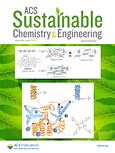
ACS Sustainable Chemistry & Engineering
Empowering researchers to shape a sustainable future.ACS Sustainable Chemistry & Engineering is a premier journal published by the American Chemical Society, dedicated to advancing knowledge and innovation in the fields of sustainable chemistry and engineering. With an impressive impact factor and a consistent ranking in the Q1 category across various disciplines such as Chemical Engineering, Chemistry, Environmental Chemistry, and Renewable Energy, this journal serves as a vital resource for researchers, professionals, and students alike. Since its inception in 2013, the journal has been committed to publishing high-quality, peer-reviewed articles that address the critical challenges of sustainability in chemistry and engineering. With no open-access option currently available, the journal emphasizes the importance of premium scholarly communication. As the field continues to evolve, ACS Sustainable Chemistry & Engineering remains at the forefront of providing cutting-edge research that impacts our understanding and application of sustainable practices in the chemical sciences.